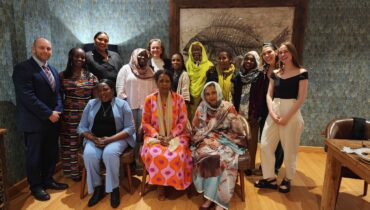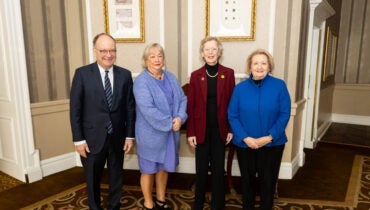During a talk entitled “Transition and Next Steps in the Central African Republic” at The George Washington University on March 1, Catherine Samba-Panza, Interim President of the Central African Republic (CAR), described the challenges she has faced as leader of the transition in CAR, and the obstacles that will face her successor after she leaves office this month. Faustin-Archange Touadéra, who served as Prime Minister from 2008 until 2013, will assume the presidency on March 25.
Samba-Panza, the country’s first woman president, argued that while her administration faced many problems, she prioritized addressing security, humanitarian, and economic concerns, while incorporating a focus on long-term development. She cited the successes of her time of office, including the peaceful elections held between December 2015 and February 2016, noting that she has had success because she kept her commitments, particularly not to run again for President.
Samba-Panza expressed gratitude to the international community for providing support during CAR’s transition, and cited the leadership of women in her country for attracting the attention of the international community. The current crisis in CAR has garnered more attention than the country has seen for most of its existence. Much of this attention has been negative, focusing on the poverty and violence that has engulfed Central African communities, abuse of civilians by UN peacekeepers, and sexual violence occurring in the camps of displaced people. However, CAR has also attracted the attention of international donors, national governments, and even the Pope.
In the past year, CAR has worked to achieve several major accomplishments: peaceful elections, the Bangui Forum – which created a plan for peacebuilding and development in the country – and the creation of the Special Criminal Court (SCC). However, in a country still in a state of insecurity, it is important that the focus remain on long-term and inclusive development and statebuilding. This means that women must be at the heart of rebuilding processes, including expanding healthcare infrastructure, helping displaced communities return to their places of origin, and holding elected office at every level. Samba-Panza has led this charge through strong leadership, but a single person will not create the type of change necessary to reshape a state that has been characterized by violence, weak governance, and poverty.
The International Rescue Committee (IRC) reported in 2014 that through the crisis, Central African women have kept communities running – carrying water long distances, walking miles to gather firewood, preparing meals, looking after children, and managing small businesses – and that they accomplish this while living in insecure camps of displaced people. Women have combatted a lack of privacy and stable housing by building makeshift barriers from scrap material. Sexual violence has been widespread in these camps. Sarah Terlouw, the IRC’s country director in CAR, said in 2014, “The severity of violence women and girls are experiencing is shocking. Yet as communities are being torn apart, women and girls are not only bearing the brunt of this conflict, they are also largely responsible for keeping their families together and providing stability in an environment that is increasingly chaotic.”
However, women in CAR are actively involved in community survival, and they want to be part of the political and economic transition. The Bangui Forum on National Reconciliation, held in Mary 2015, set a framework for CAR’s transition: laying out plans for disarmament, demobilization and reintegration (DDR), elections timelines, transitional justice, and economic development. The Forum included 700 leaders from a range of groups, including the transitional government, national political parties, major armed groups (the Séléka and anti-balaka), the private sector, civil society, traditional chiefs, and religious groups.
Women were included in the Bangui Forum, and the Security Councilpraised “the inclusive, grassroots-level manner in which the consultations were carried out, particularly by ensuring the participation of women.” Femmes Africa Solidarité (FAS), the Ministry for Social Affairs, the Gender Promotion and Humanitarian Action of CAR, and UNFPA facilitated a two-day consultation before the Forum, bringing together 150 women to share their positions related to peace, security, and women’s empowerment. Together they created recommendations, which were read at the opening day of the Forum. These recommendations assert women’s desire to be principal actors in peace and security processes, to end the impunity for violence, to build a democratic government, and to expand access to resources for women.
However, the recommendations of the 150 women involved in the consultation cannot represent the views and aspirations of all Central African women, and many women still feel that they are not being heard. Kyung-wha Kang, the Assistant Secretary-General and Deputy Emergency Relief Coordinator for UN Office for the Coordination of Humanitarian Affairs, spoke to Africa Renewal about women’s desire to be involved in the transition process during the Bangui Forum:
“I had a very interesting meeting with women leaders in the CAR capital of Bangui – I have never before had an encounter with women leaders that was so full of frustrations like this one. The women were almost at the point of anger because they felt left out and not part of the peace process. It was an indication of the real frustration about the continuing lack of security and lack of women’s integration and participation in key processes. I think the transitional authority and the international community should make sure that women’s voices are heard, elevated and made part of the peace process and reconciliation efforts.”
The Forum defined the path forward for CAR; now it is imperative that women be considered and included in all of these steps. Women’s perspectives and capabilities should be included not only in national plans and programming, but also at the local level. In last week’s talk, Samba-Panza argued that her approach to peacebuilding in CAR has been to create inclusive government and processes, incorporating representatives from all major ethnic and religious groups as well as the primary militant groups. She said, “Violence has been inscribed on the mind and in the hearts of our people for so long,” and that it is necessary to “disarm the hearts and disarm the minds” for national cohesion. Samba-Panza emphasized that the CAR crisis is not an inter-religious conflict, but has many root causes, particularly poverty and exclusion. She said, “Those who feel excluded react.” In order to end the cycle of weak governance and violence in CAR, it is crucial to build inclusive, effective state institutions and to address poverty and the lack of infrastructure, healthcare, and social services. This is only possible by including women and women’s perspectives at every step of the process.
About the Author
Briana Mawby is a 2015-2016 Hillary Rodham Clinton Research Fellow with the Georgetown Institute for Women, Peace and Security. She previously served as a research consultant for the World Bank Global Knowledge Partnership on Migration and Development Thematic Working Group on Environmental Change and Migration. Ms. Mawby has also worked at the Georgetown Center for Social Justice Research, Teaching and Service and the Center for Media and Public Affairs. She has advanced French language skills and intermediate Spanish language skills. She is a graduate of Georgetown University with an M.A. in conflict resolution, and a specialization in post-conflict reconstruction and peacebuilding in East and Central Africa. She received a certificate in Refugees and Humanitarian Crises from the Institute for the Study of International Migration. She completed her B.A. in international affairs at the George Washington University in Washington, D.C.


